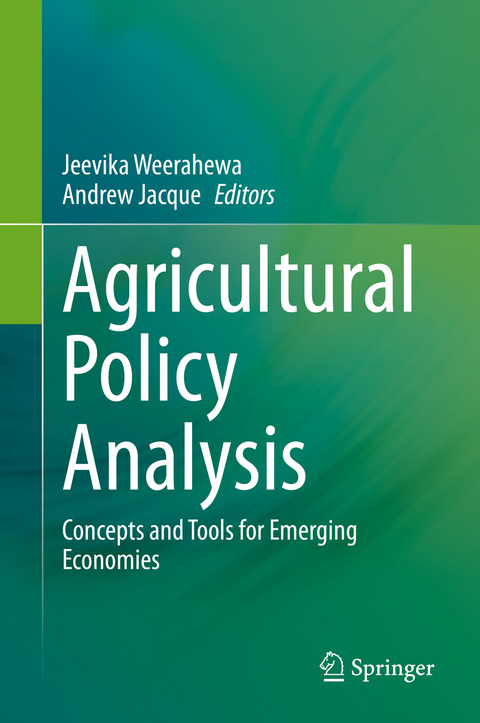
Agricultural Policy Analysis
Springer Verlag, Singapore
978-981-16-3283-9 (ISBN)
This book is of interest to public officials working in agricultural planning and agricultural policy, teachers, researchers, agro-economists, capacity builders and policymakers.
This book is centred around various interwoven topics which are fundamental to policy analysis in agriculture. Key concepts and tools that are fundamental for the analysis of agricultural policies and programmes are presented. Key concepts introduced include, the role of the state in a market economy with examples from the Sri Lankan and other developing economies, the international trade environment, and conceptual frameworks for analysing important domestic and international trade policies. It also highlights interconnections among agriculture, development, policy and illustrates the extent to which the agricultural sector contributes in achieving economic growth objectives, equity and equality objectives and environmental objectives. The book takes the readers through the nature of agricultural markets in developing countries, with special emphasis on Sri Lanka, and illustrates how the degree of competitiveness is measured at various market levels using multiple indices and methods. Several tools, with accompanying case studies, for the analysis of policies and programmes are detailed. These tools include the GTAP model, gravity models, extended benefit cost analysis, and linear programming. Tools and models are applied to the analysis of trade policies and agreements, marketing policies, environmental services, extension programmes, land tenure reforms and climate change adaptations. Case studies in relation to the agri-food policy and strategy response to COVID-19 Pandemic are also covered.
This book is of interest to public officials working in agricultural planning and agricultural policy, teachers, researchers, agro-economists, capacity builders and policymakers. Also the book serves as additional reading material for undergraduate and graduate students of agriculture, development studies, and environmental sciences. National and international agricultural scientists, policy makers will also find this to be a useful read.
Jeevika Weerahewa is the Senior Professor of Agricultural Economics attached to the Department of Agricultural Economics and Business Management, Faculty of Agriculture, University of Peradeniya, Sri Lanka. She obtained her BSc and MPhil from the University of Peradeniya and PhD from the University of Guleph, Canada. She has served as the Head of the Department of Agricultural Economics and Business Management, Faculty of Agriculture and Chairperson of the Board of Study in Agricultural Economics at the Postgraduate Institute of Agriculture, University of Peradeniya. Weerahewa serves as an Honorary Fellow at the Faculty of Veterinary and Agricultural Sciences, University of Melbourne, Australia. She is the current chair of Sri Lanka Forum of University Economists. She is a Collaborator of the International Food Policy Research Institute, a Hewlett Fellow of the International Agricultural Trade Research Consortium, a Fellow of the Canadian Agricultural Trade Policy Research Network, and a recipient of an Endeavour Fellowship awarded by the Government of Australia. Andrew Jacque, is a National Scholar of Trinidad and Tobago. He holds a BSc in agricultural science from the University of the West Indies, and M.Sc. and Ph.D. degrees in agricultural economics respectively from Michigan State University (specialty field of agricultural marketing) and Purdue University (specialty fields of economic development and policy analysis). in the USA. Most of his early professional career was spent as a public officer in the Ministry of Agriculture in Trinidad and Tobago where he was last attached to the Agricultural Planning Unit. His work in agricultural policy includes lecturing graduate courses at the University of the West Indies, with the Food and Agriculture Organisation, and assignments with Ministries of Agriculture in Trinidad and Tobago, Grenada, St. Vincent and the Grenadines, and Sri Lanka. His recent work experience is as a key expert on development projects in the UK and countries in the Africa, Caribbean, and Pacific regions.
Part 1 Policy Analysis and the Policy Environment.- 1 Overview of Agricultural Policy.- 2 Public Policy: An Overview.- 3 Agriculture and Economic Development.- Part 2 Concepts, Approaches, and Measures for Policy Analysis.- 4 The International Trading System Emalene Marcus-Burnett.- 5 Economic Concepts for Agricultural Policy Analysis.- 6 Measuring Competitiveness of Agricultural Markets.- 7 Qualitative Methods for Policy Analysis: Case Study Research Strategy.- Part 3 Tools to Analyse Sectoral and Global Regulations.- 8 General Equilibrium Analysis of Regional Trade Agreements.- 9 Analysing Trade Facilitation using Gravity Models.- 10 Analysing Marketing Policies using Market Integration Models.- 11 Partial Equilibrium Analysis of Agricultural Price Policies.- Part 4 Tools to Analyse Rural Development Programmes .- 12 Cost Benefit Analysis of Irrigation Projects.- 13 Choice Experiment Analysis of Non-Market Values of Ecosystem Services.- 14 Analysing Agriculture Extension Programmes using Randomised Control Experiments.- 15 Using Agricultural Production Functions to Analyse Land Tenure Reforms.- 16 Analysing Land Use Planning Regulations using Linear Programming Models.- 17 Economic Analysis of Climate Change Adaptations in Agriculture.- Part 5 Sri Lanka Case Studies.- 18 Political Economy of Agricultural Policies: Fertiliser Subsidy Reform.- 19 Policy Measures to Address COVID-19 Disruptions of the Agri-Food Sector.- 20 Epilogue.
| Erscheinungsdatum | 15.04.2022 |
|---|---|
| Zusatzinfo | 1 Illustrations, black and white; XXXIII, 478 p. 1 illus. |
| Verlagsort | Singapore |
| Sprache | englisch |
| Maße | 155 x 235 mm |
| Themenwelt | Naturwissenschaften ► Biologie ► Botanik |
| Naturwissenschaften ► Biologie ► Ökologie / Naturschutz | |
| Weitere Fachgebiete ► Land- / Forstwirtschaft / Fischerei | |
| ISBN-10 | 981-16-3283-9 / 9811632839 |
| ISBN-13 | 978-981-16-3283-9 / 9789811632839 |
| Zustand | Neuware |
| Informationen gemäß Produktsicherheitsverordnung (GPSR) | |
| Haben Sie eine Frage zum Produkt? |
aus dem Bereich


